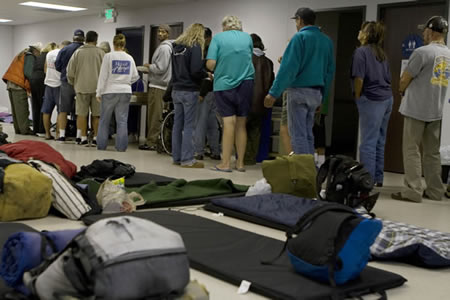Updated: Oct. 5, 2015
Two events last week dealing with homelessness tackled the issue, but with different approaches.
A group of Orange County leaders, including some from Laguna Beach, met for the first time Thursday, Sept. 24, to discuss a collaboration to end homelessness countywide. Led by Gail Eastman, a former Anaheim City Council member and the Association of California Cities-Orange County, the task force aims to “provide support and assistance toward ending homelessness in Orange County.”
The inaugural meeting comes as the American Civil Liberties Union filed a second lawsuit against the City of Laguna Beach, claiming that the city violated the American Disabilities Act by not offering five chronically homeless individuals access to some type of supportive housing, which could include access to mental and physical health services. The suit filed in August also cites violations of individual constitutional rights under the eighth and 14th amendments.
In its rebuttal filed last week, the city denied every claim, and noted that Laguna has enacted considerable measures to assist the homeless population. “Efforts that go far beyond those of other cities within Orange County,” City Attorney Philip Kohn said in his response.
A week removed from the city’s filed legal reply, Heather Johnson, a staff attorney from the ACLU commented on the rejoinder.
“The city’s response did not fundamentally answer the lawsuit,” said Johnson. “The city provided a list of items that they are doing, and it is nice that they do them, but the issue of the chronic homeless with mental and physical disabilities remains unaddressed.”
The next step in the litigation process is a hearing in front of a U.S. District Court judge in November to determine if a class action suit is possible. “The judge must certify and then set criterion for who would be able to join a larger lawsuit, potentially more disabled homeless,” she says.
“The disabled homeless with mental illness cannot access necessary services, and they are bearing the brunt of heightened law enforcement,” Johnson says.

The Alternative Sleeping Location (ASL) located in Laguna Canyon is the city’s principal tool to provide relief to homeless individuals, and does provide some accommodation, but “can only do so much,” said Mia Ferreira, an employee of the Friendship Shelter, which manages the facility for the city.
“We have room for 45 people, but have to turn away some each night. We are trying to provide basic necessities and services here to serve the homeless individuals of our community,” she said. The heated and cooled shelter includes restrooms, showers, meals, laundry facilities, sleeping mats, blankets, computer and Internet access, a secure storage area, a case management worker, and transportation to and from downtown Laguna Beach. The facility has ramps, doorways and restroom facilities to accommodate the disabled.
For several years, Ferreira along with Dawn Price, executive director of Friendship Shelter, have consistently pressed for permanent supportive housing (PSH) as the only true means of solving chronic homelessness. The city ended negotiations over locating housing on city property in June.
“We see other communities, notably Utah’s, complete success in eradicating chronic homelessness — where PSH has worked,” Price said. “The fact is, PSH takes the most vulnerable, and in many cases the most visible homeless people, off the streets and saves money by minimizing police involvement, emergency room visits, and many other public costs,” she said.
Permanent supportive housing was just one area discussed among members of the countywide task force. Among those in attendance were Laguna Beach Councilmember Toni Iseman and City Manager John Pietig.
The conversation revolved around a never implemented plan first proposed in 2008 and approved in 2012 to eradicate homeless from the county by 2020.
A census of homeless people in the county was estimated at 15,000, according to information presented by the task force. The figures reflect a drop from 2009 when the population reached 21,500 in the county.
The Commission to End Homelessness, established by county supervisors five years ago, aimed to establish a year-round emergency shelter and multi-service center by December, secure federal funding, develop 200 permanent supportive housing units, and end veteran homelessness. At least on one point, the panel made progress. In June, the supervisors approved buying land at 1000 N. Kraemer Place in Anaheim that could be used for housing 200 homeless individuals.
Locally, Price said, 21 people are housed in permanent support housing, which should grow to house 60 within the next several months. Funding for such housing comes from the Continuum of Care (CoC) Program, designed to promote community efforts to end homelessness. Even with the federal HUD support of $19 million, cities will still have to commit funds to the countywide effort to underwrite total costs.
As for the lawsuit, a motion is due in federal court Nov. 19 where the court will determine if the suit becomes a class action, said Kristopher Wood, an attorney representing the ACLU.





[…] years after a first suit against the city, the ACLU in August filed a second suit on behalf of five disabled homeless people, claiming their […]